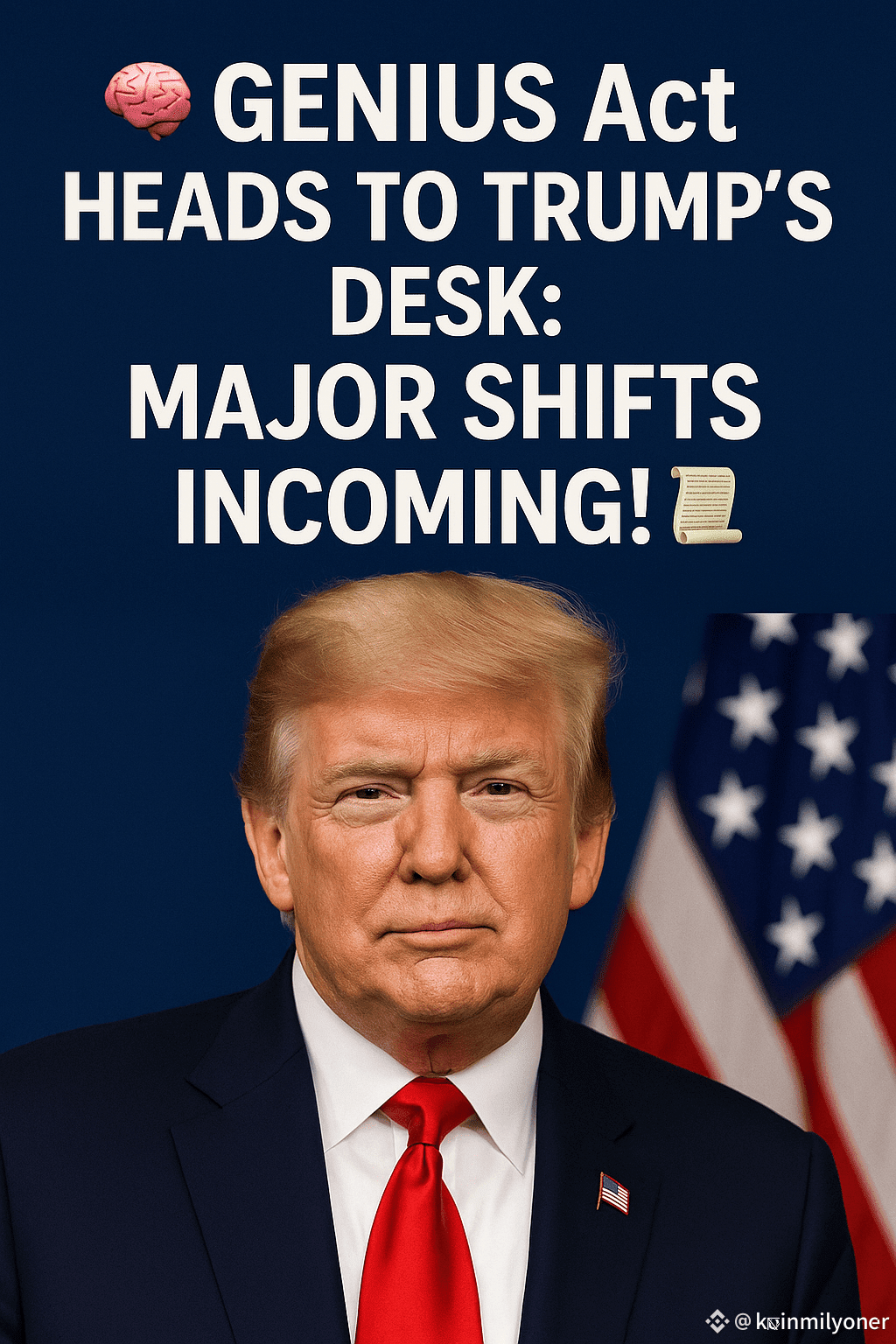Donald Trump is about to sign a law that will regulate stablecoins. This bill will set rules for how issuers of these tokens must do business in the US.
On Thursday, the US House approved three legislation about cryptocurrencies. One of them was the GENIUS Act, which stands for "Guiding and Establishing National Innovation for US Stablecoins Act."

Eleanor Terrett, a reporter, said that the measure started in the Senate and now just needs Trump's signature to become law. This is likely to happen at 2:30 pm on Friday in Washington, DC, during a "signing ceremony."
The measure will go into force 18 months after Trump signs it, or 120 days after the Treasury and Federal Reserve, who are the "primary federal payment stablecoin regulators," release final rules that put the GENIUS Act into effect.
Chart
After a number of delays, the House voted 308 to 122 to enact the GENIUS Act on Thursday. Source: Tom Emmer
Stablecoin issuers will seek to become banks.
Logan Payne, a lawyer at Winston & Strawn who works with cryptocurrencies, told Cointelegraph that the GENIUS Act makes it more appealing for stablecoin issuers to get a banking license.
He noted that a new stablecoin license under the GENIUS Act only allows a corporation to undertake "purely stablecoin issuance," but most stablecoin issuers do more than that.
Payne added, "Pretty much every stablecoin issuer in the US right now is doing things that are not allowed by that license."
Payne stated that even if an issuer has a GENIUS Act-approved license, they would still require money transmission permits from each state in order to do business across the country.
That makes stablecoin issuers want to apply for a national trust bank charter from the Office of the Comptroller of the Currency (OCC), like Circle and Ripple have done. This lets them issue stablecoins and do a lot of other things without having to get licenses in every state, he said.
Interest in stablecoins will go away.
Some crypto users are upset about a provision of the bill that says that stablecoin issuers, whether they are based in the US or not, can't provide holders or users interest or yield.
Yield offers are one of the best ways for stablecoins to get people to utilize them. Some stablecoins, like Circle's USDC (USDC), reward those who hold them on exchanges like Coinbase and Kraken. Others, like Circle's USDC (USDC), provide holders a dividend directly.
Payne stated, "I wouldn't be surprised if a lot of those plans changed or were changed in the future."
There will be "a lot of uncertainty" in DeFi.
Payne noted that the GENIUS Act might make decentralized finance (DeFi) less comfortable about how platforms should deal with stablecoins.
He remarked, "For now, we won't say much about how GENIUS will affect DeFi." "There will still be a lot of uncertainty, but in a general policy environment, if it keeps going, we'll start to get some of the answers over time."
Payne noted that "more laws and rules that fill in some of the gaps that will address DeFi" would emerge in the coming several years. The House advanced the CLARITY Act to the Senate on Thursday. This measure sorts digital assets into groups and says which agencies will control them.
Expect updates on your reserves every month.
The GENIUS Act specifies that stablecoin issuers must back their tokens with US dollars or other money items like Treasury notes at a 1:1 ratio.
The issuers will have to make the makeup of such reserves public and have them "examined by a registered public accounting firm." They will also have to provide a certification of the reports' correctness to their federal or state regulatory agency.
Foreign stablecoins are exempt, however issuers that aren't authorized are not.
After the measure is signed, it will be illegal to provide any stablecoins in the US that don't originate from a recognized issuer for three years.
It will also be against the law to provide stablecoins from other countries in the US unless the issuer of that stablecoin can and will follow the bill's legal criteria.
The law provides a lot of exceptions for foreign stablecoin issuers, such as if the Treasury decides that the nation where they are headquartered has a similar set of rules.
provided that's the case, overseas issuers may sell to US clients provided they register with the OCC and have enough money in a US bank to protect their US customers. The OCC will respond within 30 days.
In the US, there are many authorities that keep an eye on stablecoins.
The measure lets several kinds of regulated businesses, including banks, credit unions, and nonbanks, issue stablecoins. It also sets up a federal and state regulatory framework to keep an eye on them.
The National Credit Union Administration, the Federal Deposit Insurance Corporation, the Office of the Comptroller of the Currency, the Treasury, or the Federal Reserve will regulate these groups, depending on what kind they are.
It's important to note that businesses may opt to be governed at the state level if they don't have more than $10 billion in issued stablecoins. However, a state doesn't have to establish a stablecoin regulator.
#PowellVsTrump #GENIUS #TRUMP #AltcoinSeasonLoading #USCryptoWeek $BTC $ETH $XRP




